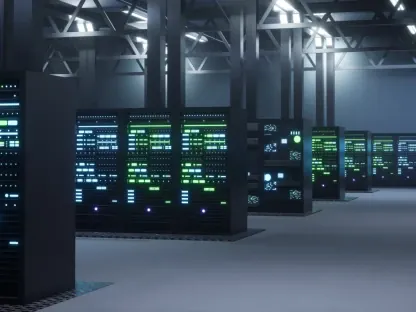The recent announcement of the winners of the Phase 1 Utility/Data Challenge track by the U.S. Department of Energy (DOE) Office of Electricity (OE) spotlights a monumental step forward for the American-Made Digitizing Utilities Prize Round 2. This initiative, designed to transform data management within the energy sector, places a strong emphasis on addressing contemporary demands like electrification and the integration of renewable energy sources. With cybersecurity threats continually evolving, the competition is more relevant than ever.
Enhancing Data Management in the Energy Sector
Transformation of Data into Actionable Information
The American-Made Digitizing Utilities Prize focuses on converting vast amounts of data from power grids into actionable and reliable information. This task is critical as the energy sector copes with increased electrification and renewable energy integration. The immense data produced needs to be processed efficiently to improve utility response capabilities and overall system performance. Selected teams have proposed innovative solutions that leverage advanced tools and data analytics. These solutions aim to ensure efficient, secure, and responsive energy delivery systems. By addressing challenges related to data processing, storage, and security, these innovations will help utilities better manage and utilize their data resources.
Modern energy systems not only produce unprecedented amounts of data but also face the challenge of rapidly analyzing this data for meaningful insights. Efficient data management systems are essential to handle the scale and complexity of information generated by modern grids. These systems enable utilities to make informed decisions swiftly. Furthermore, improving data management can help predict and prevent potential issues before they impact the grid, thereby contributing to a more reliable and resilient energy infrastructure. The DOE’s initiative underscores the need for cutting-edge data management solutions that can keep pace with the evolving landscape of the energy sector.
Addressing Modern Energy Demands
Modern energy systems are increasingly complex, requiring sophisticated data management techniques. The competition’s emphasis on data analytics is a response to the demands posed by electrification and renewable energy sources. As these elements become more prevalent, utilities must adapt to maintain reliable and efficient service. The digitization of utilities facilitates this adaptation, enabling a more seamless integration of renewables and electric vehicles. Advanced data analytics allow for more precise monitoring and forecasting, which in turn supports the reliability of the power grid.
Increased electrification and the integration of renewable energy sources present unique challenges, including the intermittent nature of renewables like solar and wind power. Traditional grid management approaches are often inadequate for such complexities. Therefore, there is a pressing need for systems that can handle these variabilities in real-time. The winners of the Phase 1 challenge have showcased solutions that can revolutionize how data is used to optimize grid performance and ensure seamless integration of new energy sources. These advanced analytics provide utilities with the tools to forecast energy production and consumption trends more accurately, thereby stabilizing supply and demand.
Tackling Cybersecurity Threats
Importance of Cybersecurity in Digital Transformation
As utilities transition towards digital systems, the threat of cyber-attacks grows. The DOE recognizes this challenge and has included a specific track focusing on cybersecurity within the prize competition. This track emphasizes the development of robust strategies to protect digital infrastructure from cyber threats. The cybersecurity track encourages teams to innovate in ways that protect sensitive data and ensure the resilience of energy systems. With the rapid evolution of cyber threats, it is imperative for the energy sector to stay ahead with proactive measures and cutting-edge defenses.
Cybersecurity is a paramount concern for digital transformation in the energy sector. The rise in cyber threats poses significant risks to the reliability and safety of power grids. Breaches could lead to data theft, operational disruptions, and even catastrophic failures that could affect large populations. Thus, implementing robust cybersecurity measures is no longer optional but mandatory. The DOE’s initiative seeks solutions that not only address known vulnerabilities but also anticipate future threats. Effective cybersecurity in utilities involves continuous monitoring, real-time threat detection, and automated response strategies to neutralize risks before they can cause damage.
Solutions to Combat Cyber Threats
Teams participating in the cybersecurity challenge are tasked with creating solutions that safeguard data and maintain system integrity. The winners in this track will be expected to address a variety of threats, from data breaches to sophisticated cyber-attacks targeting critical infrastructure. By focusing on both prevention and response, the selected teams will contribute to a more secure energy sector. Effective cybersecurity measures will be essential as utilities increasingly digitize their operations.
Developing comprehensive cybersecurity solutions involves a multi-faceted approach. This includes deploying advanced encryption techniques, implementing secure communication protocols, and designing systems that can withstand and rapidly recover from cyber-attacks. The winning teams are expected to demonstrate innovative approaches to secure data operations and protect the grid from unauthorized access. By leveraging technologies such as blockchain and artificial intelligence, these solutions aim to enhance the security framework of utilities, providing a protective shield against the constantly evolving cyber threat landscape. This effort is crucial in safeguarding not just the infrastructure but the trust and confidence of consumers in the digital energy ecosystem.
Innovative Solutions from Winning Teams
ChainSCADA’s Blockchain Integration
One of the winning teams, ChainSCADA, collaborated with Hingham Municipal Lighting Plant to integrate blockchain-based Public Key Infrastructure (PKI) with DNP3 communications. This approach enhances security and trust, streamlines operations, improves compliance, and mitigates cybersecurity risks. By leveraging blockchain technology, ChainSCADA aims to provide a more secure and reliable data management framework. This innovation is indicative of the broader trend towards using blockchain for enhanced security in various sectors.
Blockchain technology offers a decentralized, immutable ledger that is inherently secure, making it an ideal solution for managing critical data within utility operations. By integrating PKI with DNP3 communications, ChainSCADA has developed a system that ensures secure and verifiable communication channels crucial for grid operations. This advancement not only improves data integrity and security but also adds layers of trust and transparency to utility processes. Such solutions are essential in an era where data breaches and cyber threats are becoming more sophisticated and pervasive. The successful implementation of this blockchain-based approach could set a precedent for other utilities seeking similar upgrades.
Enterprise Graph DB’s Cloud-Based Analytics
The Enterprise Graph DB team, in partnership with Alabama Power Company and E Source, is developing a cloud-based analytics storefront. Utilizing CosmosDB, the project aims to query an analytics-ready graph database powered by automated data validation pipelines from enterprise data sources, enhancing data quality and analytics capabilities. This solution exemplifies the shift towards cloud-based platforms for more efficient data processing and analysis. The integration of sophisticated databases allows for more nuanced and effective data utilization.
Cloud-based solutions offer scalability and flexibility that traditional systems lack, making them well-suited for handling the dynamic needs of modern energy grids. The Enterprise Graph DB team’s solution leverages these cloud capabilities to provide a unified platform where data from various sources can be seamlessly integrated and analyzed. Advanced data validation and querying capabilities enhance the accuracy and reliability of insights derived from the data. This enables utilities to make informed decisions quickly, improving operational efficiency and customer satisfaction. The project stands as a testament to how cloud technology can revolutionize data management in the energy sector.
Grid Elevated’s MIDAAS Platform
Grid Elevated’s MIDAAS Platform, developed with Heber Light & Power, focuses on the Multi-Source Data Acquisition, Analytics, Sharing, and Security toolkit. This platform transforms the vast data generated by the energy transition into meaningful information for decision-making, underscoring the importance of data analytics in modern energy management. The MIDAAS Platform is designed to support utilities in handling large volumes of data, facilitating better insights and more informed decisions.
The MIDAAS Platform aims to be a comprehensive toolkit that assists utilities in navigating the complexities of modern energy systems. By consolidating data from multiple sources, the platform offers a holistic view of grid operations, enabling more strategic planning and proactive management. The ability to analyze and share data in real-time is particularly valuable for utility operations, contributing to improved reliability and customer service. As the energy sector continues its transition towards renewables and increased electrification, platforms like MIDAAS will be critical in ensuring that utilities can efficiently manage and optimize their operations.
Predictive Analytics and Risk Management
NC State University’s Storm-Based Outage Prediction
NC State University, with North Carolina’s Electric Cooperatives, is developing a predictive analytics tool to forecast storm-based outages. This tool aims to aid utilities in making informed staffing and supply decisions with real-time estimates, highlighting the application of predictive analytics in energy management. By forecasting outages, utilities can better prepare and respond, minimizing downtime and improving service reliability.
Predictive analytics tools like those developed by NC State University are essential for enhancing grid resiliency. By accurately forecasting storm-based outages, utilities can preemptively deploy resources and personnel to critical areas, significantly reducing response times. This proactive approach not only minimizes disruptions but also helps mitigate the economic impacts of outages on both utilities and consumers. Advanced machine learning algorithms and real-time data feed into these predictive models, ensuring high accuracy and timeliness. Such tools represent a significant leap forward in disaster preparedness and response for the energy sector, making grids more robust against natural calamities.
Climate Risk Mitigation by Climformatics
The U.S. Department of Energy (DOE) Office of Electricity (OE) recently unveiled the winners of the Phase 1 Utility/Data Challenge track, marking a significant advancement in the American-Made Digitizing Utilities Prize Round 2. This initiative aims to revolutionize data management within the energy sector, focusing on contemporary needs such as electrification and the integration of renewable energy sources. As cyber threats continue to evolve, the competition’s importance has never been more pronounced. The Prize encourages innovative solutions to modernize and secure the energy grid, ensuring it meets the rising demands for clean energy and resilient infrastructure. By spotlighting these winners, the DOE underscores the critical role of data management and cyber resilience in navigating the future of energy. The initiative is not only about technological advancement but also about fostering a culture of innovation and preparedness to tackle the complexities of modern energy demands. This ongoing effort is pivotal in shaping a sustainable and secure energy future for the nation.









